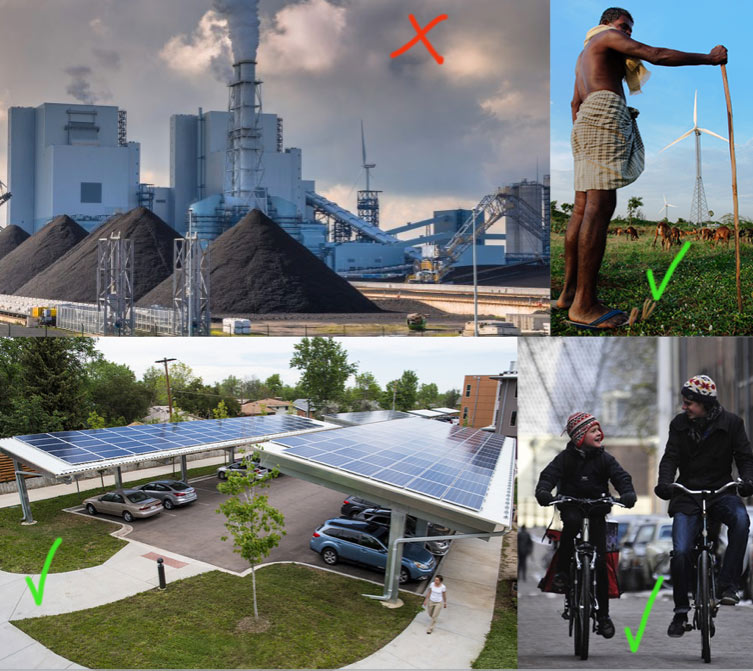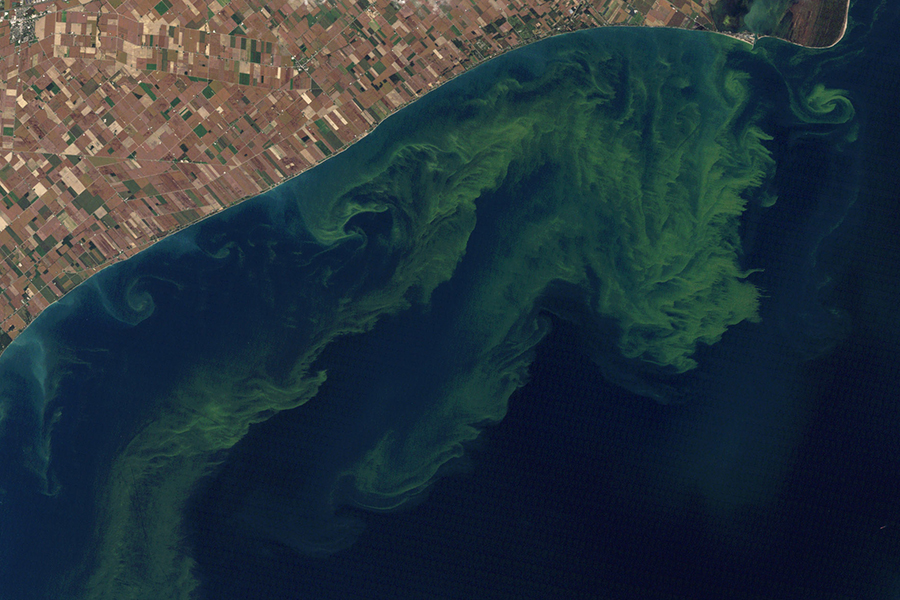Your research paper
The theme for your research paper will be Climate change solutions or addressing the challenges of the climate crisis..
We basically have three choices, mitigation, adaptation, and suffering. We're going to do some of each.
The question is what the mix is going to be. The more mitigation we do, the less adaptation will be required, and the less suffering there will be.
-John Holdren, 2007, Director of the White House Office of Science and Technology Policy, Assistant to the President [Obama] for Science and Technology
Mitigation
...means addressing the roots of a problem. When it comes to human-caused global warming:
At the topmost level, climate science has one thing to teach in regards to the well-being of our species and the rest of the bio-sphere: to curtail global warming, stop burning fossil fuels.-Climate scientist Peter Kalmus in Being the Change
 Mitigation includes:
Mitigation includes:
- Reducing greenhouse gas emissions.
- Investing in new energy-generation technology.
- Conservation.
The general outlines of what needs to be done is well summarized in Gain not pain (CarbonTracker).
Sources & Sinks
We'll use Project Drawdown's concepts and accounting of Carbon (equivalent) sources and sinks. We'll use some of the slides from their Climate 101 resources and refer to their solutions and quantitative estimates of $CO_2$ savings:
Project Drawdown publishes their research into solutions to climate change. The solutions fall into 3 categories:
- Reducing sources of greenhouse gases,
- Supporting nature’s “sinks” for storing carbon, and
- Centering equality in global action. This category includes health and education solutions which address inequalities, such as educating girls, and making contraception widely available, which also have consequences for carbon emissions.
This diagram shows the carbon-equivalent GHG emissions, and natural sinks, which already draw carbon out of our atmosphere:

Adaptation

Adaptation is "the act or process of changing to better suit a situation" (Merriam-Webster)
Williamson Daily News - Officials deem Williamson's flood walls in good condition.
With respect to climate change, this means making changes to reduce consequences and impacts (without addressing the underlying problem).
General topic for your papers: SOLUTIONS
You'll research a solution related to mitigation or adaptation.
Our use of fossil fuels is so entwined in so much of modern industrial society, that there is no single silver bullet to solve climate change...
But there is "silver buckshot" (Katharine Hayhoe): Many partial solutions that together add up.
And those partial solutions are already available. We don't need new technology, we need to mobilize political will to use them.
Learning across cultures
Wittingly and unwittingly, H. Sapiens' now has a large influence on how life proceeds on Earth, as a result of our population growth and technology development--how we've learned to harness energy for human purposes.

Composite satellite images of the world at night, NASA

Algae blooms fed by farm floods add to Midwest's climate woes, Inside Climate News, 2019, NASA image of Lake Erie.
Adapting to and mitigating climate change is still new, but it will be an ongoing challenge for humans for the rest of the time our species walks planet Earth--hopefully many millenia!
(Synergy after Pres. Stoltzfus today...) The world is a big place and people have been trying things out to address the challenges of climate crisis (or maybe they've been doing things that would help, though not motivated by climate change at all!) in their own locations. It's like there a little "laboratories" all over the world! What can we learn from each other??
You don't know what all the unforeseen consequences of a "solution" are until you try it!
So, taking inspiration from Goshen College's strengths in experiential learning and global education (SST), we can ask: What can we learn from how other cultures, past and present, have lived on Earth?
- What climate-related solutions have people tried already?
- How has it worked out? What unforeseen benefits and drawbacks were there?
- Can we adopt it and adapt it to our circumstances? (or not...)
So, one aspect of your research paper into a possible solution will be to learn from a particular attempt to try that solution somewhere in the world.
Where to look for topic ideas
- The Conversation's Environment and Energy category. (Recommended by Fritz!)
- New York Times' Climate and Environment category. (After a handful of free articles, requires a subscription, which is free for GC students.)
- Project Drawdown is an excellent starting point and source on mitigation.
- Paul's pinboard links are mostly climate change related.
Some possible Adaptation topics
- Flooding: The Dutch approach / reforming insurance / building codes in flood-prone areas / buyouts
- Fire: building codes / indigenous practices / goats!
- Training for jobs in longer-term sustainable industries.
- Urban heat islands: Trees / reflective / building design
- Justice and inequality: assistance for non-polluting countries / pollution / food waste & hunger / work conditions in extreme heat
Additional Mitigation topic ideas
- Nuclear energy: France / Japan
- Buildings: Sweden / NY / Ithaca's financing of insulation
- Transportation: Urban design / ITDP and Bus Rapid Transit / electric vehicle incentives
- Wind: Denmark collaborating with Norway
Biofuels: Brazil$\Rightarrow$ "It takes about 100 acres worth of biofuels to generate as much energy as [1] acre of solar panels". Biofuels require not just any land, but valuable farmland.- Geothermal: Iceland
- Cap and Trade: China / CA / Acid rain and $SO_2$ in the US
- Carbon taxes & markets: British Columbia / Ireland
- Carbon credits: for farmers for sequestering carbon in the soil / for maintaining forests / planting mangroves
- Natural solutions: Tree planting perils and possibilities / Wetland restorations / Miyawaki forests
- Population growth: China / Italy
- Financing renewables: Kenya / Bangladesh / "Pay as you go" / microgrids / co-ops / community solar / leasing roofs / History: U.S. Rural electrification - Loans to renewable cooperatives today?
- Government programs: Net metering / Feed-in Tariffs / Tax incentives
- Carbon capture & storage
- Land stewardship: indigenous control vs national parks
- Legal approaches: Environmental rights